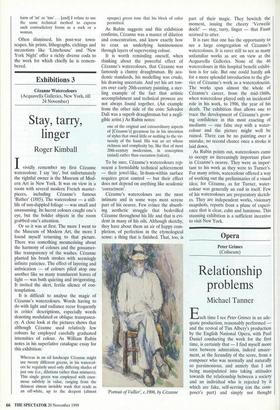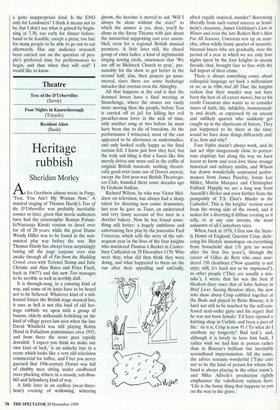Opera
Peter Grimes (Coliseum)
Relationship problems
Michael Tanner
Each time I see Peter Grimes in an ade- quate production, reasonably performed and the revival of Tim Albery's production by the English National Opera, with Paul Daniel conducting the work for the first time, is certainly that — I find myself more torn between admiration, indeed amaze- ment, at the fecundity of the score, from a composer who was normally and naturally so parsimonious, and anxiety that I am being manipulated into taking attitudes towards the relationship between a society and an individual who is rejected by it which are fake, self-serving (on the com- poser's part) and simply not thought SOME artists mature late, but many more only win through to a reasonable measure of fame (or critical acclaim) relatively late in life. One such is Karl Weschke. Born in Ger- many in 1925, Weschke was a prisoner of war here (1945-1948) before settling in Britain. For the last 40 years he has lived on Cape Cornwall and painted tough but beautiful landscapes and figure subjects. His images have a powerful mythic quality employing bold linearity and settled masses, like hieroglyphs on ancient rock. In recent years, though rather belatedly, Weschke has been recognised for the artist of distinction and originality he has always been, with displays at both the Tates in London and St Ives and a monograph published on him. Weschke first visited Egypt in 1990, a long-cher- ished ambition. Repeated trips have inspired a lightening of mood and palette as Weschke the expressionist has given way to a gentler more lyrical artistic persona, classic not romantic, and capable of greater nuance, greater subtlety. His current show, entitled Echoes of Egypt, which includes 'Deir El Bahri' (above), at the enterprising Six Chapel Row gallery, Bath (until 29 November), proves that this particular old dog has learnt
more than one new trick. Andrew Lambirth hrough. Most commentators on this absorbing opera feel compelled to write at length about the changes which Britten, Pears and Montagu Slater made to Crabbe's poem, and seem to be unable to decide whether • they added meritorious complexity or just confused the issues. The reason, I think, that there is so much more energy devoted to Grimes in that respect than there is to the difference between, say, Othello and Otello is that crucial elements from Crabbe survive to colour the work, while centrally it has been quite re-worked by the composer and his accomplices.
In Tim Albery's production, which for me played against a vivid backdrop of my last experience of the opera, Peter Stein's and Carlo Rizzi's amazing account in Cardiff last February, the under-characteri- sation of most of the solo figures, not to mention the portrayal of the chorus as a collection of virtually fascist thugs — but who is being fascistic in showing them in this light? — goes unameliorated. Where Stein brought the village almost surreally, though ago realistically, to life in its teem- ing individuality, or rather bestowed that upon it, Albery has the chorus as, literally at the outset, a part of the scenery, and lets the subordinate figures in the drama, which means everyone apart from Grimes him self, remain two-dimensional, I had never been so struck by what a cipher Ellen Orford is. That wasn't the fault of Vivian Tierney, particularly, though her account was not distinguished, but of the indetermi- nate way in which she relates to Grimes, indeed to the action as a whole. She is one person who almost forces one back to Crabbe to try to discover who on earth she might be. Philip Brett, in a provocative essay 'Grimes Today' in the programme book, says rightly:
What is so brilliant about Peter Grimes, and so pertinent in today's climate, is that, although it is clearly an allegory of homosex- ual oppression (as well as other kinds), it is not sexual at all. All suggestions of eroticism of any kind were ruthlessly expunged from the libretto.
Quite so, but where does that leave Ellen? She seems to be relegated to that realm of sexlessness inhabited in traditional English drama by 'The Schoolteacher' before they all turned out to be, like all teachers, child abusers. The grounds for her attachment to Grimes, and his slenderer attachment to her, don't so much shift as vanish on inspection. It is notable how much less hor- rifying a moment his striking at her in Act II, Scene One is than one would expect it to be. Britten doesn't want us to be too appalled by him, otherwise we might not indulge his flights of poetic fancy, his gen- eral visionariness, as much as he wants us to. The moment in The Boar where every- one stops chattering, at Grimes's entry, and he launches on 'Now the Great Bear and Pleiades' is a stunning coup de thedtre, but aren't we being asked to accept a Grimes who is cultivating a speculative bent which fails to fit with the inarticulate boor of the action? — and still more when he goes on 'Who, who, who, who can turn skies back and begin again?'
I suppose that virtually all successful operatic composers are opportunistic, but it is decent and intelligently self-interested to conceal the fact. Grimes is, after all, the first through-composed opera Britten wrote, and so it is not surprising that its almost incessant musical brilliance has gen- erated a kind of complacent tolerance of its manifest failings. If they struck me more forcibly than they have sometimes done, in this production, that may be because Paul Daniel's conducting allowed one time off to meditate as well as experience the piece. His accounts of the interludes were relaxed, though he naturally managed to whip up a convincing storm, if with slightly emaciated-sounding strings. The only way, I think, that Grimes can be wholly effective while you are seeing it is if it surges as it did under Rizzi, with a Welsh chorus whose impact was stunning.
About Robert Brubaker's Grimes I had mixed feelings. He evidently takes Jon Vickers as his model in the role, and that is the kind of interpretation I prefer. Unfor- tunately, his voice tended to let him down in the same way, and the same places, that Vickers's did, especially when he hoped to soar aloft for a soft high note, and instead cracked. His acting was mainly of the frus- trated style of impotent arm waving, stalk- ing around the stage and suggesting that he had that within that passes show. This is consonant with the character, except that like Hamlet he is extraordinarily, self-refut- ingly eloquent; with Hamlet you know what he has within, with Grimes you have to take it on faith that there is something spe- cial, which makes him a 'marginalised' fig- ure. I have the impression that Brubaker will adjust to his vocal uncertainties, and then his mad scene will be as genuinely affecting as at the first night it could only promise to be.
As a regular member of the ENO audi- ence who has usually to travel back home by train after the performance, I do wonder why, if possible, performances are geared to end at about a quarter to eleven. That is the time of the last rush hour of the day, with no taxis to be had, and huge gaps between Tube services. It means that, for someone hoping to catch a last train, the last act can be overshadowed by anxiety of a quite inappropriate kind. Is the ENO only for Londoners? I think it means not to be, but I don't see what is gained by begin- ning at 7.30, too early for dinner before- hand to be feasible, except a pizza; too late for many people to be able to go out to eat afterwards. Has any audience research been carried out on the question of peo- ple's preferred time for performances to begin, and thus when they will end? I would like to know.




























































































 Previous page
Previous page